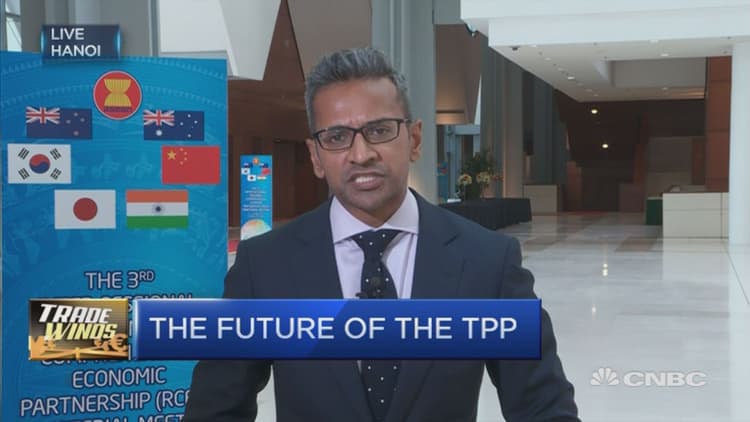As the 11 remaining Trans-Pacific Partnership countries continue talks without Washington this week, certain member states now need convincing to stay on board with the massive trade deal.
No longer the world's largest trade pact after President Donald Trump's decision to withdraw the U.S. earlier this year, the TPP remains alive — for now. Its surviving participants have agreed to forge ahead without Washington with the goal of completing preparatory work for a treaty by November, as agreed upon in May.
However, internal divisions are a key obstacle as some participants look to rework existing provisions in light of Washington's absence.
"On the one hand, you have Japan, Australia and New Zealand who would like to push ahead with the agreement as is, just with some only technical modifications to allow it to come into force," Andrew Staples, Southeast Asia director at Economist Corporate Network, told CNBC on Friday. "But countries such as Malaysia and Vietnam, on the other hand, are questioning whether a deal makes sense without getting access to the U.S. market."
Before Washington pulled out from the TPP, Kuala Lumpur and Hanoi were seen as the pact's top beneficiaries amid expected rises in foreign direct investment inflows and exports. Vietnam's garment industry and Malaysian electronics, in particular, were seen strengthening from the removal of tariffs in the U.S. and other major importers.
To advance in the U.S. market, both Southeast Asian governments originally agreed to sweeping changes in their business environments, particularly regarding transparency, government movement of data as well as environmental and labor standards, Staples explained.
But now that broadened U.S. access is off the table, both nations are re-considering their commitments, he continued. "Malaysia, in particular, has said they would like to re-open negotiations on contentious issues, such as drug development data."

Vietnam, meanwhile, is debating which TPP elements can be renegotiated, Prime Minister Nguyen Xuan Phuc was quoted as saying last month.
The reluctance of both countries is a thorn in Tokyo's side. Spearheading current TPP discussions, the world's third-largest economy hopes for a U.S. return to the table, but says existing members should not lose momentum, Japanese Prime Minister Shinzo Abe recently told CNBC.
In addition to persuading hesitant members, the Japanese leader is also under pressure to ensure the smooth completion of a bilateral trade deal with Europe — the Japan-EU Economic Partnership Agreement — which is a factor that could influence TPP talks.
"Progress toward a Japan-EU deal will fuel momentum behind Abe's efforts to finish a TPP-11 agreement without the U.S., in part by keeping Japan's protectionist farmers and their backers in his Liberal Democratic Party on the defensive," analysts at consultancy Eurasia Group said in a Wednesday note.
"If, however, negotiations on the Japan-EU Economic Partnership Agreement unexpectedly collapse or a final deal is not ratified by both sides, Abe's push to burnish his leadership credentials and advance a robust trade policy agenda will suffer a large setback," they wrote.

